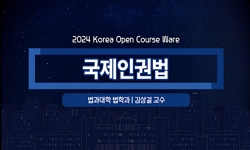A performer uses the work of an author during the process of a performance. In Korea, performers are given performance rights for non-fixed performances. The definition of “public performance” in Korea Copyright Act is appropriate in the sense tha...
http://chineseinput.net/에서 pinyin(병음)방식으로 중국어를 변환할 수 있습니다.
변환된 중국어를 복사하여 사용하시면 됩니다.
- 中文 을 입력하시려면 zhongwen을 입력하시고 space를누르시면됩니다.
- 北京 을 입력하시려면 beijing을 입력하시고 space를 누르시면 됩니다.
https://www.riss.kr/link?id=A107747229
- 저자
- 발행기관
- 학술지명
- 권호사항
-
발행연도
2021
-
작성언어
-
- 주제어
-
KDC
300
-
등재정보
KCI등재
-
자료형태
학술저널
-
수록면
177-204(28쪽)
- DOI식별코드
- 제공처
- 소장기관
-
0
상세조회 -
0
다운로드
부가정보
다국어 초록 (Multilingual Abstract)
A performer uses the work of an author during the process of a performance. In Korea, performers are given performance rights for non-fixed performances. The definition of “public performance” in Korea Copyright Act is appropriate in the sense that a copyright holder has the right to use his or her work and present it to the public, however, it is not intended to mean the performer’s right to perform. When reviewing of particular international treaties and foreign legislation, a performer’s right is essentially the right to fix his or her performance, or to transmit it to a place other than the venue. The public performance right of Korean performers is defined as the right to present unfixed performances to the public, but that “to present” should be understood as a concept of communication. Real-time one-way transmission of public performance (including sound and images) through internet should be covered by the performance rights of performers. The important point is, that the concept of public performance should not be used as the same concept in copyright holders, performers and the remuneration right. Therefore, it is necessary to separate and define each pertaining performance concept of the copyright holder, performer, and remuneration right in order to adequately assess and delivery fair rights to all performers.
동일학술지(권/호) 다른 논문
-
가상·증강현실 내 ‘오버레이(겹쳐 표시하기)’ 기술의 법적 쟁점과 규율 법리 연구
- 한국지식재산연구원
- 김연수 ( Kim Yunsoo )
- 2021
- KCI등재
-
투명 식품포장디자인의 보호범위와 창작성 ―유럽연합일반법원 2020. 3. 12. 선고 T-352/19 판결을 중심으로―
- 한국지식재산연구원
- 양대승 ( Yang Daeseung )
- 2021
- KCI등재
-
기술테마 분석을 통한 기술기회발굴 연구 ―3D 프린팅 기술 사례를 중심으로―
- 한국지식재산연구원
- 서원철 ( Seo Wonchul )
- 2021
- KCI등재
-
IP기업의 기술적 다각화 전략을 통한 비체계적 위험의 분산 효과에 관한 실증연구
- 한국지식재산연구원
- 이재성 ( Lee Jaeseong )
- 2021
- KCI등재





 KCI
KCI







